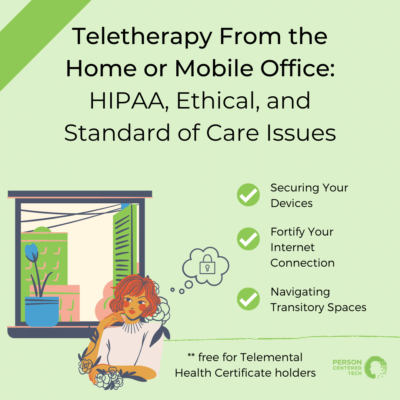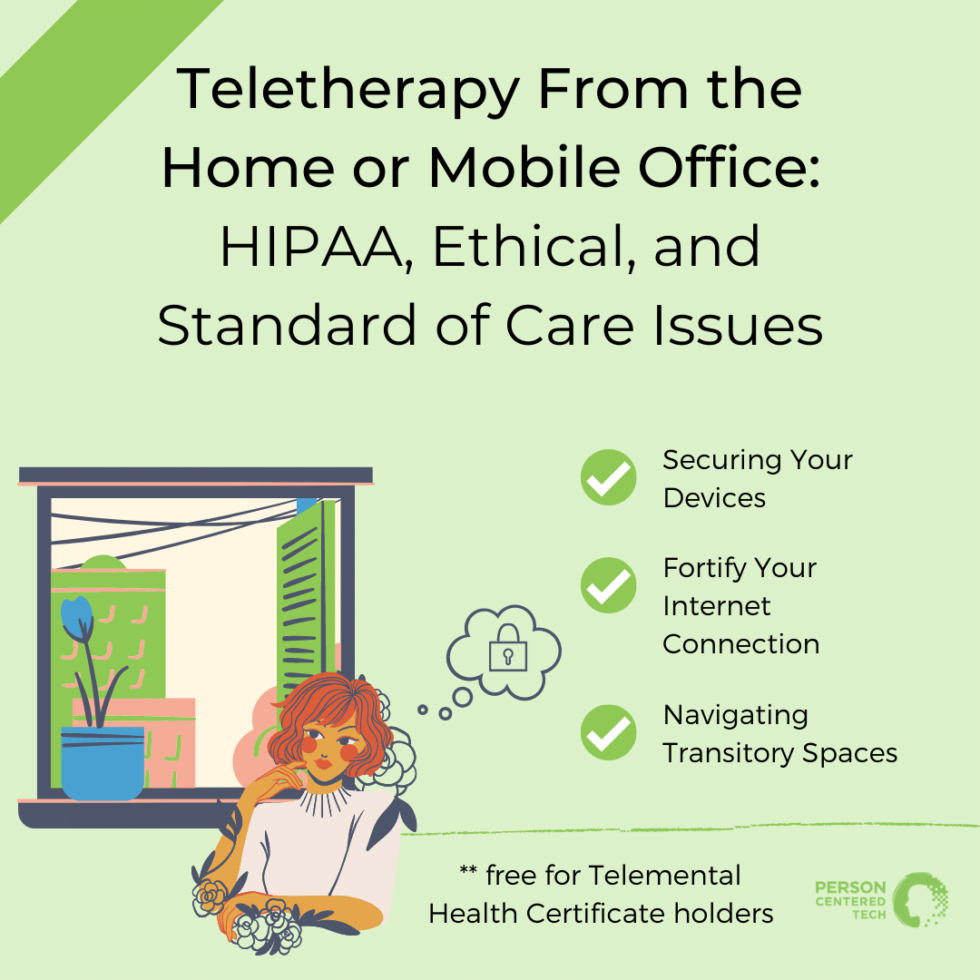Teletherapy From the Home or Mobile Office: HIPAA, Ethical, and Standard of Care Issues
1 CE Credit Hour. Legal-Ethical. Continuing Education Session Replay
Presented By: Roy Huggins, LPC NCC w/ Liath Dalton
Course Description

Maintaining Quality Client Care… From Anywhere.
You don’t have to be brand new at providing care through teletherapy to struggle with some of the basics of providing the care you want to offer to your clients.
We’ll walk you through HIPAA, Ethical, and Standard of Care Issues that can trip up even well practiced teletherapy clinicians.
This introductory-level course for counselors, marriage and family therapists, clinical social workers, and counseling and clinical psychologists will equip learners to navigate teletherapy from the home or mobile office.
Educational Objectives
- Create practice policies for the home teletherapy office that maintain privacy of client information to HIPAA and relevant ethical standards
- Create policies for mobile office management that facilitate secure, private teletherapy sessions which meet the standard of care
- Set up devices in the home or mobile office in a manner that meets HIPAA Security standards
Syllabus
- HIPAA and ethical standards which need to be addressed in teletherapy practice environments
- Privacy of teletherapy sessions
- Confidentiality and integrity of information handled in teletherapy practice spaces
- Security of client information handled by Internet connections and devices
- Handling security and privacy issues unique to the home environment
- Family/roommate proximity
- Duality of purpose in practice spaces
- Residential vs commercial services, e.g. Internet access
- Setting up devices to meet and maintain HIPAA standards in the home
- Teletherapy security, privacy, and standard of care in mobile environments
- Hotel rooms
- Guest bedrooms
- RVs, trailers, and campsites
References
- US Dept. of Health and Human Services. (2006). HIPAA Administrative Simplification . Washington, DC: Author.
- US Dept. of Health and Human Services. (2013). HIPAA Omnibus Final Rule . Washington, DC: Author.
Presented/Developed By
 Roy Huggins, LPC NCC, is a counselor in private practice who also directs Person-Centered Tech. Roy worked as a professional Web developer for 7 years before changing paths, and makes it his mission to grow clinicians’ understanding of the Internet and other electronic communications mediums for the future of our practices and our professions.
Roy Huggins, LPC NCC, is a counselor in private practice who also directs Person-Centered Tech. Roy worked as a professional Web developer for 7 years before changing paths, and makes it his mission to grow clinicians’ understanding of the Internet and other electronic communications mediums for the future of our practices and our professions.
Roy is an adjunct instructor at the Portland State University Counseling program where he teaches Ethics, and is a member of the Zur Institute advisory board. He has acted as a subject matter expert on HIPAA, security and clinical use of technology for Counseling licensure boards and both state and national mental health professional organizations. He has co-authored or authored 2 book chapters, and he routinely consults with mental health colleagues on ethical and practical issues surrounding tech in clinical practice. He served for 5 years on the board of the Oregon Mental Health Counselors Association and then the Oregon Counseling Association as the Technology Committee Chair.
He really likes this stuff.
Course Co-Presenters
 Liath Dalton is PCT’s deputy director and a co-owner. Liath is especially passionate about helping therapists be resourced and supported in navigating the security compliance process and identifying the solutions and processes that meet the particular needs of their practices. Liath’s consultation area of expertise is focused on selecting the right combination of services and tech that not only meet the legal-ethical needs of mental health practices, but also the functionality, efficiency, and cost-effectiveness needs as well.
Liath Dalton is PCT’s deputy director and a co-owner. Liath is especially passionate about helping therapists be resourced and supported in navigating the security compliance process and identifying the solutions and processes that meet the particular needs of their practices. Liath’s consultation area of expertise is focused on selecting the right combination of services and tech that not only meet the legal-ethical needs of mental health practices, but also the functionality, efficiency, and cost-effectiveness needs as well.
Program Notices
Accuracy, Utility, and Risks Statement: This program discusses strategies for complying with HIPAA and covered ethics codes. It may not include information on all applicable state laws. Misapplication of the materials, or errors in the materials, could result in data breaches or non-compliance with applicable laws or ethics codes.
Conflicts of Interest: None noted.
Commercial Support: None.
This course is subject to our cancellation/refund policy and complaint policy.

